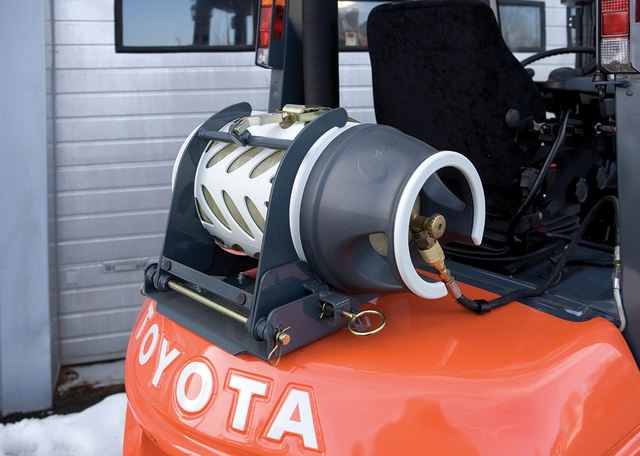 Natural gas is inexpensive, readily available in most countries and clean-burning. |
Cheryl Bikowski is the marketing communications supervisor at Gamber-Johnson. Gamber-Johnson provides top-of-the-line forklift mounting systems to businesses in the materials handling industry.
Increasing fuel costs and growing support for eco-friendly production practices are driving large and small companies alike to consider ways to green their operations. Alternative fuel sources can cut harmful emissions and reduce costs when used in workplace vehicles. As such, they should be considered by any business that is looking to reduce costs.
Benefits of using alternative fuelCompanies can realise many benefits by switching to a renewable fuel source, including:
* Improved fuel efficiency: Alternative fuels offer better efficiency than traditional fuels, which means that lift trucks can perform for longer on one tank of fuel. Across a large operation, this can have a big impact.
* Lowered costs: Better fuel efficiency translates to reduced costs for vehicle operation. Over time, this recoups the monies spent on new lift trucks and translates to savings for the company.
* Public goodwill: Companies which embrace green technology can receive a boost in the public perception for their environmental activism.
* Environmental benefits: Switching to alternative energy sources will emit less greenhouse gas and air pollutants, reduce domestic dependence on foreign oil and boost the local economy.
Types of alternative fuelWhile there are many different types of alternative fuel, not all are well suited for lift trucks. At present, fuel options include:
* Biogas (RNG or renewable natural gas): Biogas is a natural byproduct of anaerobic digestion of organic matter. As such, it is easily renewable and can turn organic matter from landfills, livestock and wastewater into fuel. Biogas is seen as a green option because it captures methane that would otherwise be introduced into the atmosphere, creates local jobs and offers an alternative to fossil fuels.
* Natural gas: There are two main types of natural gas - compressed natural gas (CNG) and liquefied natural gas (LNG). Both are inexpensive, readily available in most countries and clean-burning.
* Hydrogen: Hydrogen is an attractive alternative fuel source because it does not produce harmful emissions. It has been used to fuel space flight since the 1950s. Commonly, hydrogen is used in hydrogen fuel cell vehicles.
* Ethanol: Made from corn, ethanol is a natural fuel that is widely available in some countries. Much of the gasoline in the USA already contains 10% ethanol by weight. Alternative fuel vehicles can run on a higher concentration of ethanol fuel, conserving resources.
Selecting the right type of fuelWhile biogas is popular in Germany, where one-quarter of publicly available natural gas refueling stations use 100% RNG, it is not yet widespread in the USA. As such, it may not be a good choice for lift trucks since sourcing RNG can be difficult. If there is a source of biogas near you, it can be an energy-efficient and cost-effective option. Sanitation trucks in Los Angeles County run on biogas produced from county landfill waste.
If you have the option of purchasing new forklifts outfitted with hydrogen fuel cells, or slowly replacing old trucks with HFC vehicles, this can be a very good option.
Natural gas fuel can be a very good option for forklifts, since it is readily available and inexpensive. It may be easier to find new and used forklifts that consume natural gas, making this a convenient option for companies. Likewise, ethanol is widely available and makes a convenient choice for forklift fuel.
The alternative fuel tax credit, which covers fuel used in lift trucks, makes it even more cost effective to switch to alternative fuels. At present, the US federal government also offers tax credits for purchasing alternative fuel cell vehicles through December 2014, which can encourage a switch. If you are considering greening your warehouse by purchasing lift trucks that run on alternative fuel, these government incentives may be the extra push that you need to commit.